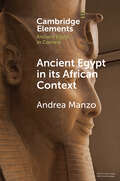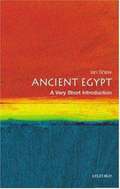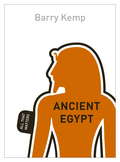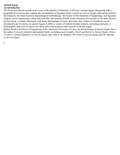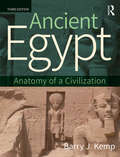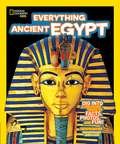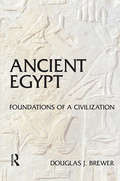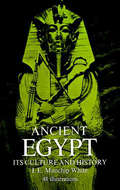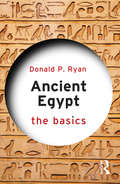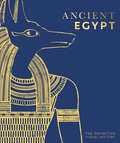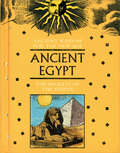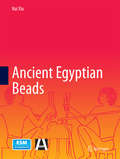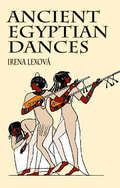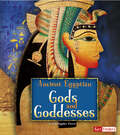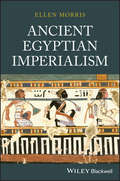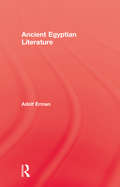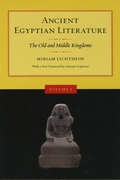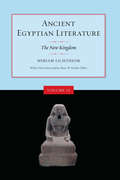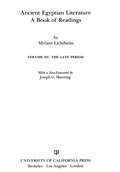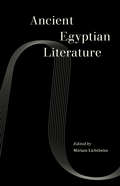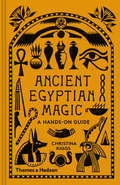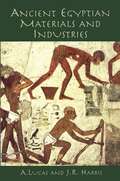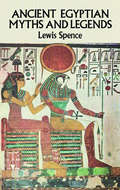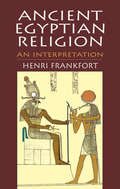- Table View
- List View
Ancient Egypt in its African Context: Economic Networks, Social and Cultural Interactions (Elements in Ancient Egypt in Context)
by Andrea ManzoThis Element is aimed at discussing the relations between Egypt and its African neighbours. In the first section, the history of studies, the different kind of sources available on the issue, and a short outline of the environmental setting is provided. In the second section the relations between Egypt and its African neighbours from the late Prehistory to Late Antique times are summarized. In the third section the different kinds of interactions are described, as well as their effects on the lives of individuals and groups, and the related cultural dynamics, such as selection, adoption, entanglement and identity building. Finally, the possible future perspective of research on the issue is outlined, both in terms of methods, strategies, themes and specific topics, and of regions and sites whose exploration promises to provide a crucial contribution to the study of the relations between Egypt and Africa.
Ancient Egypt: A Very Short Introduction
by Ian ShawThe ancient Egyptians are an enduring source of fascination - mummies and pyramids, curses and rituals have captured the imagination of generations. We all have a mental picture of ancient Egypt, but is it the right one? How much do we really know about this great civilization? In this absorbing introduction, Ian Shaw describes how our current ideas about Egypt are based not only on the thrilling discoveries made by early Egyptologists but also on fascinating new kinds of evidence produced by modern scientific and linguistic analyses. He also explores the changing influences on our responses to these finds, through such media as literature, cinema and contemporary art. Each chapter deals with a different aspect of ancient Egypt, from despotic pharaohs to dismembered bodies, and from hieroglyphs to animal-headed gods.
Ancient Egypt: All That Matters
by Barry J KempFor three thousand years a dominant force, Ancient Egypt is arguably the most successful and longest lasting human civilization yet. In this pacy guide, world renowned Egyptologist Professor Barry Kemp seeks to explain why Ancient Egypt was able to thrive with such stability for such a long time. The answers may be surprising - Kemp shows that human rights and career progression played an important role, as well as the traditional forces of slave labour and religion. Taking a thematic approach, Kemp examines ancient Egypt's georgraphy, rulers, society, morality, family life, art and architecture, military, science, philosophy and religion. He then goes on to ask what happened to Ancient Egypt, and to point to its lasting influence today.
Ancient Egypt: All That Matters
by Barry J KempFor three thousand years a dominant force, Ancient Egypt is arguably the most successful and longest lasting human civilization yet. In this pacy guide, world renowned Egyptologist Professor Barry Kemp seeks to explain why Ancient Egypt was able to thrive with such stability for such a long time. The answers may be surprising - Kemp shows that human rights and career progression played an important role, as well as the traditional forces of slave labour and religion. Taking a thematic approach, Kemp examines ancient Egypt's georgraphy, rulers, society, morality, family life, art and architecture, military, science, philosophy and religion. He then goes on to ask what happened to Ancient Egypt, and to point to its lasting influence today.
Ancient Egypt: An Introduction
by Salima IkramThis book provides an introduction to one of the greatest civilizations of all time—ancient Egypt. Beginning with a geographical overview that explains the development of Egyptian belief systems as well as its subsequent political development, it examines methodology, the history of the discipline of Egyptology, religion, social organization, urban and rural life, and death. <p><p>It also includes a section on how people of all ranks lived. Lavishly illustrated, with many unusual photographs of rarely seen sites that are seldom illustrated, this volume is suitable for use in introductory-level courses on ancient Egypt. <p><p>It offers a variety of student-friendly features, including a glossary, a bibliography, and a list of sources for those who wish to further their interest in ancient Egypt.
Ancient Egypt: Anatomy of a Civilization (All That Matters Ser.)
by Barry J. KempThis fully revised and updated third edition of the bestselling Ancient Egypt seeks to identify what gave ancient Egypt its distinctive and enduring characteristics, ranging across material culture, the mindset of its people, and social and economic factors. In this volume, Barry J. Kemp identifies the ideas by which the Egyptians organized their experience of the world and explains how they maintained a uniform style in their art and architecture across three thousand years, whilst accommodating substantial changes in outlook. The underlying aim is to relate ancient Egypt to the broader mainstream of our understanding of how all human societies function. Source material is taken from ancient written documents, while the book also highlights the contribution that archaeology makes to our understanding of Egyptian culture and society. It uses numerous case studies, illustrating them with artwork expressly prepared from specialist sources. Broad ranging yet impressively detailed, the book is an indispensable text for all students of ancient Egypt and for the general reader.
Ancient Egypt: Dig Into a Treasure Trove of Facts, Photos, and Fun! (National Geographic Kids Everything)
by National Geographic Kids Staff Crispin Boyer<P><p>The ancient Egyptians thought big and built bigger, leaving behind monuments and messages that have endured for five millennia despite tomb robbers and the ravages of time. Pyramids and mummies tell us about their deaths, but new technologies are peeling the wraps off their mysterious lives. <p>In Everything Ancient Egypt kids will discover all they want to know about the mysteries of ancient Egypt and learn new weird, wacky, and fascinating facts as well. Sections in the book include Rise of the Pharaohs, Death and the Afterlife, Life in Ancient Egypt, and Fun With Ancient Egypt (a section that provides readers with exciting hands-on learning!). Stunning photos and an interactive glossary round out this exciting and engaging new series addition.</p>
Ancient Egypt: Foundations of a Civilization
by Douglas J. BrewerAncient Egypt is a beautifully illustrated, easy-to-read book covering the formative era of the Egyptian civilization: the age before the pyramids. Douglas Brewer shows why an awareness of the earliest phase of Egyptian history is crucial to understanding of later Egyptian culture. Beginning with a quick review of the fields of Egyptology and archaeology, Ancient Egypt takes the reader on a compelling survey of Egypt's prehistoric past. The books tours the Nile Valley to explore its impact on all aspects of life, from day-to-day living to regional politics, and introduces the reader to the Nile Valley's earliest inhabitants and the very first "Egyptians".
Ancient Egypt: Its Culture and History
by J. E. WhiteFor 30 centuries, before Greece's glory or Rome's grandeur came into being, mankind played out a drama along the banks of the Nile which for sheer splendor, mighty works, and significance to civilization, is unique. The lure of Egyptology is as old as the Pyramids themselves; what is new is the modern work done in the field. Few books make so up-to-date and thorough a survey of what is known, in a form suited for the general reader, as this fine work, first published as recently as 1952, and now with a new Introduction for this edition by the author.Central to all facts about ancient Egypt is the Nile; this is where the author starts us in our understanding of the civilization. With a vivid picture of the land, cut off by deserts on all sides, but watered and sheltered like a 675-mile oasis, we see how the culture sprang up; how it produced the astonishing figure of the Pharaoh, half-god, half-king, yet living, loving, mortal man; we learn all that modern scholarship has discovered about him. Closely allied to the Pharaoh were the priests and the state officials, form the Vizier to the Chancellor to such lesser officials as the Director of the King's Dress; the facts about their interrelationships, roles, and modes of life make for the most interesting kind of reading here. Not surprisingly, architects and craftsmen played a highly important part in what was, despite its pomp and magnificence, an eminently practical culture; and White gives us a fine account of their methods and meaning to the life of Egypt. A complete chapter is devoted to the commoner, the peasant, the man who brought food for all from the soil along the river and on whose labor all of Egypt's achievements were built.One of the most valuable portions of this book is its historical section. In three chapters we are given, in vivid capsule form, the entire history of ancient Egypt from prehistoric times to the end of the dynasties. A fold-out chart enables the reader to relate the various periods quickly. Maps of the ancient region are provided; and for this edition an expanded, updated bibliography has been compiled.
Ancient Egypt: The Basics (The Basics #0)
by Donald P. RyanAncient Egypt: The Basics offers an accessible and comprehensive introduction to the history, archaeology and influence of this fascinating civilization. Coverage includes: A survey of Egyptian history from its earliest origins to the coming of Islam Life and death in ancient Egypt Key archaeological discoveries and important characters Egypt’s impact and reception through to the modern day Lively and engaging, this is an indispensable resource for anyone beginning their studies of Egyptian history, culture and archaeology, and a must-read for anyone who wants to learn more about the country’s long and captivating past.
Ancient Egypt: The Definitive Visual History (DK Classic History)
by DKTake a journey through Ancient Egypt and see how the pharaohs once lived!An enticing and insightful guide that covers 3,000 years of life under the pharaohs (c. 3200-30 BCE) from the early kings of Egypt to the reign of Cleopatra and the Roman conquest, this book explains it all! Written by a team of respected Egyptologists, this book includes the following exciting things: • Themed spreads explore developments in areas like religion, writing, painting, ceramics and medicine. • Biography spreads feature the lives of the most influential pharaohs and queens. • Detailed maps set the main sites in context, and show the growth of the civilization and its trade network. • An optional 80-page reference section provides a directory of the pharaohs and gods and goddesses. Unlock every aspect of Ancient Egypt, from pharaohs and pyramids to ordinary people&’s everyday lives and beliefs. With 31 Egyptian dynasties and 3,000 years of history, from the time of Narmer to that of Cleopatra and so much more, this is the perfect comprehensive guide to Egypt&’s ancient civilization.There's so much to learn and experience with this up-to-date biography on Ancient Egypt. With more than 850 photos, illustrations and maps, this is the perfect book for thinkers, borrowers, life-long learners or anyone with an interest in ancient civilizations and Egyptology.
Ancient Egypt: The Secrets of the Sphinx (Ancient Wisdom for the New Age)
by Zelda SharifDiscover how the wisdom of ancient Egypt can provide guidance for living in the modern world with this fascinating, fully illustrated guide. Today, there are countless New Age philosophies designed for self-improvement and spiritual development, but none of them match the timeless wisdom contained within the mysteries of Ancient Egypt. This volume introduces readers to the ways of the pharaohs; their relationship to the land and the river Nile; their positive attitudes toward death and the afterlife as set down in The Book of the Dead; and their sacred rites, symbols, and stones which have had a profound influence on cultures throughout history. Fully illustrated with magnificent artwork, this volume also covers Ancient Egyptian history, archeological sites, mysterious relics, and speculation about the meaning and power of the pyramids.
Ancient Egyptian Beads
by Nai XiaThis book presents a detailed analysis and thorough study of the unique collection of Ancient Egyptian beads in the Petrie Museum of Egyptian Archaeology in London. The book first discusses the archaeological value of beads and the method employed in the study of them, especially emphasizing the importance of the technique of bead-making for dating purposes. It then examines and evaluates various schemes for the classification of beads. The book goes on to propose a new classification system and works out a comprehensive corpus of beads with the aid of sixteen plates. Next, the book features a chronological survey that details the material, typology (including the technical peculiarities), use, arrangement and pictorial representation of beads throughout the nine divisions or periods of Ancient Egyptian history. This survey points out the characteristics of each period as well any contact Egypt may have experienced with foreign countries as shown by the beads. It also corrects much wrong identifications of materials and mistaken datings. This book is based on the Ph. D dissertation written by pioneering Chinese archaeologist Xia Nai when he studied in London College University some 70 years ago and who had direct access to considerable firsthand resources at the forefront of Egyptology research. It represents a crucial and long-awaited advance in archaeology, not only for Egypt but for the study of the past across Africa and beyond.
Ancient Egyptian Dances
by Irena LexováDancing was important to the ancient Egyptians. One of the few books available in English on this topic, this carefully researched, profusely illustrated work investigates the origins, nature and role of dance in Egyptian culture. Features 80 figure drawings and illustrations adapted from tomb paintings, reliefs, other authentic sources. New introduction. Bibliography.
Ancient Egyptian Gods and Goddesses (Ancient Egyptian Civilization Ser.)
by Christopher ForestAncient Egyptians relied on gods and goddesses every day to rule the sky, bring the rain, and more. Find out why the Egyptians worshipped these powerful beings and the roles they played in everyday life.
Ancient Egyptian Imperialism
by Ellen MorrisOffers a broad and unique look at Ancient Egypt during its long age of imperialism Written for enthusiasts and scholars of pharaonic Egypt, as well as for those interested in comparative imperialism, this book provides a look at some of the most intriguing evidence for grand strategy, low-level insurgencies, back-room deals, and complex colonial dynamics that exists for the Bronze Age world. It explores the actions of a variety of Egypt’s imperial governments from the dawn of the state until 1069 BCE as they endeavored to control fiercely independent mountain dwellers in Lebanon, urban populations in Canaan and Nubia, highly mobile Nilotic pastoralists, and predatory desert raiders. The book is especially valuable as it foregrounds the reactions of local populations and their active roles in shaping the trajectory of empire. With its emphasis on the experimental nature of imperialism and its attention to cross-cultural comparison and social history, this book offers a fresh perspective on a fascinating subject. Organized around central imperial themes—which are explored in depth at particular places and times in Egypt’s history—Ancient Egyptian Imperialism covers: Trade Before Empire—Empire Before the State (c. 3500-2686); Settler Colonialism (c. 2400-2160); Military Occupation (c. 2055-1775); Creolization, Collaboration, Colonization (c. 1775-1295); Motivation, Intimidation, Enticement (c. 1550-1295); Organization and Infrastructure (c. 1458-1295); Outwitting the State (c. 1362-1332); Conversions and Contractions in Egypt’s Northern Empire (c. 1295-1136); and Conversions and Contractions in Egypt’s Southern Empire (c. 1550-1069). Offers a wider focus of Egypt’s experimentation with empire than is covered by general Egyptologists Draws analogies to tactics employed by imperial governments and by dominated peoples in a variety of historically documented empires, both old world and new Answers questions such as “how often and to what degree did imperial blueprints undergo revisions?” Ancient Egyptian Imperialism is an excellent text for students and scholars of history, comparative history, and ancient history, as well for those interested in political science, anthropology, and the Biblical World.
Ancient Egyptian Literature
by Adolf ErmanThis book is an impressive collection of some of the earliest literature still extant from the great Ancient Egyptian civilization. Much of the material contained in this work -- poems, narratives, songs and prayers -- was translated here and made accessible to lovers of antiquity for the first time. Covering a range of topics including schools, religion and love, the collected works here provide the reader with a deeper understanding of ancient life along the Nile.
Ancient Egyptian Literature
by Miriam Lichtheim Antonio LoprianoFirst published in 1973 - and followed by Volume II in 1976 and Volume III in 1980 - this anthology has assumed classic status in the field of Egyptology and portrays the remarkable evolution of the literary forms of one of the world's earliest civilizations. Volume I outlines the early and gradual evolution of Egyptian literary genres, including biographical and historical inscriptions carved on stone, the various classes of literary works written with pen on papyrus, and the mortuary literature that focuses on life after death. Introduced with a new foreword by Antonio Loprieno. Volume II shows the culmination of these literary genres within the single period known as the New Kingdom (1550-1080 B.C.). With a new foreword by Hans-W. Fischer-Elfert. Volume III spans the last millennium of Pharaonic civilization, from the tenth century B.C. to the beginning of the Christian era. With a new foreword by Joseph G. Manning.
Ancient Egyptian Literature
by Miriam Lichtheim Hans-W Fischer-ElfertFirst published in 1973 - and followed by Volume II in 1976 and Volume III in 1980 - this anthology has assumed classic status in the field of Egyptology and portrays the remarkable evolution of the literary forms of one of the world's earliest civilizations. Volume I outlines the early and gradual evolution of Egyptian literary genres, including biographical and historical inscriptions carved on stone, the various classes of literary works written with pen on papyrus, and the mortuary literature that focuses on life after death. Introduced with a new foreword by Antonio Loprieno. Volume II shows the culmination of these literary genres within the single period known as the New Kingdom (1550-1080 B.C.). With a new foreword by Hans-W. Fischer-Elfert. Volume III spans the last millennium of Pharaonic civilization, from the tenth century B.C. to the beginning of the Christian era. With a new foreword by Joseph G. Manning.
Ancient Egyptian Literature
by Joseph G. Manning Miriam LichtheimFirst published in 1973 - and followed by Volume II in 1976 and Volume III in 1980 - this anthology has assumed classic status in the field of Egyptology and portrays the remarkable evolution of the literary forms of one of the world's earliest civilizations. Volume I outlines the early and gradual evolution of Egyptian literary genres, including biographical and historical inscriptions carved on stone, the various classes of literary works written with pen on papyrus, and the mortuary literature that focuses on life after death. Introduced with a new foreword by Antonio Loprieno. Volume II shows the culmination of these literary genres within the single period known as the New Kingdom (1550-1080 B.C.). With a new foreword by Hans-W. Fischer-Elfert. Volume III spans the last millennium of Pharaonic civilization, from the tenth century B.C. to the beginning of the Christian era. With a new foreword by Joseph G. Manning.
Ancient Egyptian Literature: A Book Of Readings
by Miriam LichtheimFirst published in 1973, this anthology has assumed classic status in the field of Egyptology and portrays the remarkable evolution of the literary forms of one of the world’s earliest civilizations. Beginning with the early and gradual evolution of Egyptian genres, it includes biographical and historical inscriptions carved on stone, the various classes of works written with pen on papyrus, and the mortuary literature that focuses on life after death. It then shows the culmination of these literary genres within the single period known as the New Kingdom (1550–1080 B.C.) and ends in the last millennium of Pharaonic civilization, from the tenth century B.C. to the beginning of the Christian era. An introduction written in three parts by Antonio Loprieno, Hans-W. Fischer-Elfert, and Joseph G. Manning completes this classic anthology.
Ancient Egyptian Magic: A Hands-on Guide
by Christina RiggsAn entertaining and informative introduction to how ancient Egyptians practiced magic in their daily lives. In the ancient world, if you needed a love charm, wanted to contact your dead wife, or needed the ability to fly like a bird, the magicians of Egypt were the ones who could make it happen. In Ancient Egyptian Magic, Christina Riggs explores how the Egyptians thought about magic, who performed it and why, and also helps readers understand why we’ve come to think of ancient Egypt in such a mystical way. Readers will learn how to cure scorpion bites, discover why you might want to break the legs off your stuffed hippopotamus toy, and uncover whether mummies really can come back to life. Readers can also learn how to save a fortune on pregnancy tests—urinating on barley grains will answer that question— as well as how to use the next street parade to predict the future or ensure that an annoying neighbor gets his comeuppance. Was magic harmless fun, heartfelt hope, or something darker? Featuring demons, dream interpreters, the Book of the Dead, and illustrations from tomb paintings and papyrus scrolls, Riggs breathes new life into ancient magic and uses early texts and images to illuminate the distinctions between magic, religion, and medicine.
Ancient Egyptian Materials and Industries (Egypt)
by J. Harris A. LucasThe majesty and splendor of ancient Egypt were largely the result of the remarkably advanced technological skills developed by its artisans and craftsmen. This fascinating, comprehensive, and detailed study of ancient Egyptian technology meticulously describes the extent to which these workers and other Egyptians developed and used the land's vast resources.First published in 1926 and later revised and enlarged, this monumental work has become a standard reference, unparalleled in any other branch of archaeology. This volume reprints the fourth edition, painstakingly revised in light of more recent research and archaeological evidence.Among the subjects examined in the thoroughly documented text are the wealth of materials and processes that were an integral part of Egyptian daily life: the use of animal products, building materials, cosmetics, perfumes, and incense; fibers, glazed ware, glass and its manufacture; metals and alloys, painting materials, pottery making, woodworking, precious and semi-precious stones; distillation of alcoholic beverages; materials used in the mummification process, and much more.Enormously erudite, with an abundance of detailed information, Ancient Egyptian Materialsand Industries is an essential reference, valuable to students of Egyptology and classical civilizations and of vital interest to anyone intrigued by the long and remarkable history of technological development.
Ancient Egyptian Myths and Legends
by Lewis Spence"Let us walk in the gloom of the pyramids, in the cool shadows of ruined temples, aye, through the tortuous labyrinth of the Egyptian mind itself, trusting that by virtue of the light we carry we shall succeed in unravelling to some extent the age-long enigma of this mystic land." — from Chapter One.In this classic study, a noted mythologist made perhaps the first serious attempt to review the religious history of ancient Egypt in the light of the science of modern mythology. Instead of regarding Egyptian mythology and legend as unique, "classic" and inviolate, as did many Egyptologists, Spence saw Egyptian religious thought as part of world mythology, rooted in primitive conceptions common to mankind as a whole and related to those of many other cultures. In supporting this thesis, Spence offers an immensely erudite in-depth survey of the broad spectrum of Egyptian gods and goddesses, cults, and beliefs, as well as a concise review of Egyptian history, manners, customs, and archaeology.Animism, totemism, fetishism, creation myths, and other aspects of early religious beliefs are explored in an introductory chapter. The author then goes on to discuss the Egyptian priesthood, mysteries and temples, the cult of Osiris; Ra the Sun-God, Anubis, Horus, Thoth, and numerous other deities; the Book of the Dead, the birth of Hatshepsut, sacred trees, alchemy, the festival of Bast, Egyptian art, magic, and amulets, legends; and a host of other topics.Enhanced with over 50 photographs and illustrations, this book belongs in the library of any student of ancient Egypt or of early man's attempts, through mythology and legend, to give order, meaning, and purpose to his world.
Ancient Egyptian Religion: An Interpretation (Egypt)
by Henri FrankfortFascinating book explores the underlying concept of the changeless as the basis of Egyptian religion, and how it unifies what scholars had believed to be an unrelated jungle of weird myths, doctrines, and practices generated by local cults. Relation of the idea of the changeless to moral and political philosophy, Egyptian government and society, literature and art. ". . . one of the finest elucidations of these materials that we have anywhere." -- American Historical Review. Chronological Table. Index. Preface. 32 halftones.
